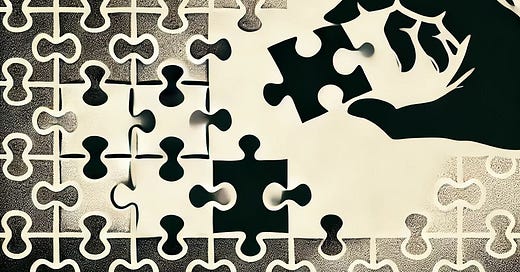Life Is a Learning Process of Creating the Whole from Parts
Approach life as a learning process and ask yourself, "What do I believe?" The result will likely be a cascade of memories highlighting actions, thoughts, and experiences fitting a particular set of Virtues or Values-in-action. This cascade will provide the basis for a nice structure or Narrative that you can offer to yourself or another to express who you believe yourself to be. This process also has the powerful effect of providing a sense of continuity and rightness in your life.
What it is not is a means of selecting what is True and Correct as if from a bin of differentiated facts.
Senses, reflexes, and learning mechanisms – this is what we start with, and it is quite a lot when you think about it. If we lacked any of these capabilities at birth, we would probably have trouble surviving.
Puzzles
Ever put together a puzzle? If so, have you tried doing so with the image-side turned down so you only have the bland cardboard cutouts to work with? The latter is a lot harder and typically only done by those whose desire to self-challenge is much higher than mine. But why is it more challenging? The shape of the pieces is the same, and isn't a puzzle simply about fitting them together? Alas, no, it isn't, or at least the process isn't that simple. Shapes matter, but so does the whole, the image, we're creating. While not actively conscious, building a puzzle includes possessing a pre-established guide of the larger image through which we funnel the shapes to make a connection. This is similar to how we read, where the conscious experience is engaging with one word at a time, but our eyes have already taken in the sentence and the brain has predicted the outcome to make comprehension faster.
This whole-part strategy is a mechanism for weaving together disparate pieces of information. However, it's just that — a mechanism or strategy that doesn't create something but has to work with what is given. Thankfully life is a whole lot bigger than any one of our perceptions, so we can create new stories quite often and even ones that are different from those of another despite having been in the same place and time.
Have you ever expressed a memory of childhood to a sibling and had them dispute it? Did you have a moment of confusion when declaring one's view of an event only to have a spouse, friend, or colleague direct attention to a different view of that same event or a piece from it that wasn't seen? Welcome to the puzzle-making that is experience.
Images
How does this fit with the initial "What do I believe?" question. Glad you ask. We generally only talk about "life experience" once we've gathered a certain amount of it. As a consequence we don't appreciate what went into creating it, taking our perception as gospel or simply the "correct" view. Not much in life feels better than being right and we go out of our way to keep that feeling alive and well.
But here is what we are not born with: information, data, rules, software, knowledge, lexicons, representations, algorithms, programs, models, memories, images, processors, subroutines, encoders, decoders, symbols, or buffers – design elements that allow digital computers to behave somewhat intelligently. Not only are we not born with such things we also don’t develop them – ever.
We don’t store words or the rules that tell us how to manipulate them. We don’t create representations of visual stimuli, store them in a short-term memory buffer, and then transfer the representation into a long-term memory device. We don’t retrieve information or images or words from memory registers. Computers do all of these things, but organisms do not.
The above list of terms and quotes concerns a common metaphor for describing human cognition: a computer. While we as human beings are inevitably going to use metaphors to help us understand ourselves, like any other content of thought, we can get too caught up in it, losing the trees for the forest. Further, if we don't question the assumptions of our metaphor, we can run ourselves directly into a difficulty that otherwise could have been avoided.
Rather than looking at our minds as retrieval devices, consider instead a painter. We have the canvas of our biology, social structure, and relationships working with the paints of our senses, reflexes, and learning mechanisms. Information here is not like data in a machine, as if a part of reality that can be retrieved from within it. We assume this in phrases like “I got it” when referring to understanding or “I’m just using facts” when positing an opinion as if information actually is like a puzzle piece waiting to be placed in the right spot. Instead, what we consider information/facts are the resulting images pieced together through learning processes within our socially-embedded personal history.
This is not a call for a post-fact society. Nor are we getting into the swamp of declaring every opinion is equal to any other. Such is more concerned with the functions of our learning and its application within different areas of life. We're here simply considering the basic process of how we develop a worldview. And at that level, it is little wonder we love the feeling of rightness and continuity. We get into the weeds/swamp of difficulty by mistaking the end result of our thinking strategy with the strategy itself and declaring our personal perspective equivalent to the whole of reality itself.
A Living Canvas
This leads us to consider ourselves and our beliefs about the world differently. Rather than being reflections of the world itself, our beliefs are attempts at piecing together the varieties of information our body/mind parses from within the world. Even we ourselves can be seen as paintings on a canvas, so long as we never forget there is still paint to be used and space to be painted upon.
When we stop and rest upon a single thought/idea and think we have no more room to move, the result is fusion, stagnation, and anxiety as we attempt to keep reality molded to a singular form. Further, such fusion makes us incapable of seeing how those around us, including our loved ones, are moving along using their version of the same process we are. When they see differently, when they express themselves in an alternative fashion, they are not being contrary to a singular correct reality, but instead are working within it, just from a different vantage point.
Right and wrong still matter, but judging such doesn't have to be the first and only means of interacting with another and ourselves. The vast majority of human behavior is an honest attempt at dealing with and working within a reality that we only see a part of and are commonly fooled into believing we see as a whole. When we consider that we ourselves, not just those we disagree with, are operating in this same learning process, we may find a lot more space to move, understand, and grow than we initially thought. Embrace life as a learning process, and have compassion for the journey you share with all humanity.
Reference:
Aeon. "Your brain does not process information and it is not a computer – Robert Epstein | Aeon Essays." Aeon. 18 May 2016. Web. 14 Feb. 2018. <https://aeon.co/essays/your-brain-does-not-process-information-and-it-is-not-a-computer>





